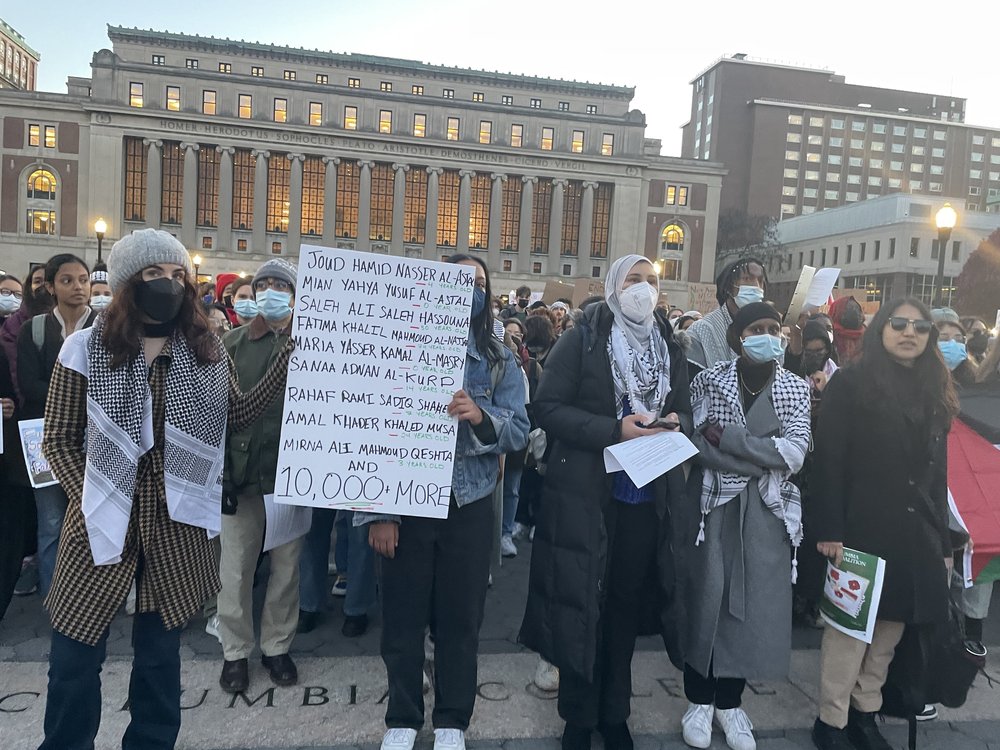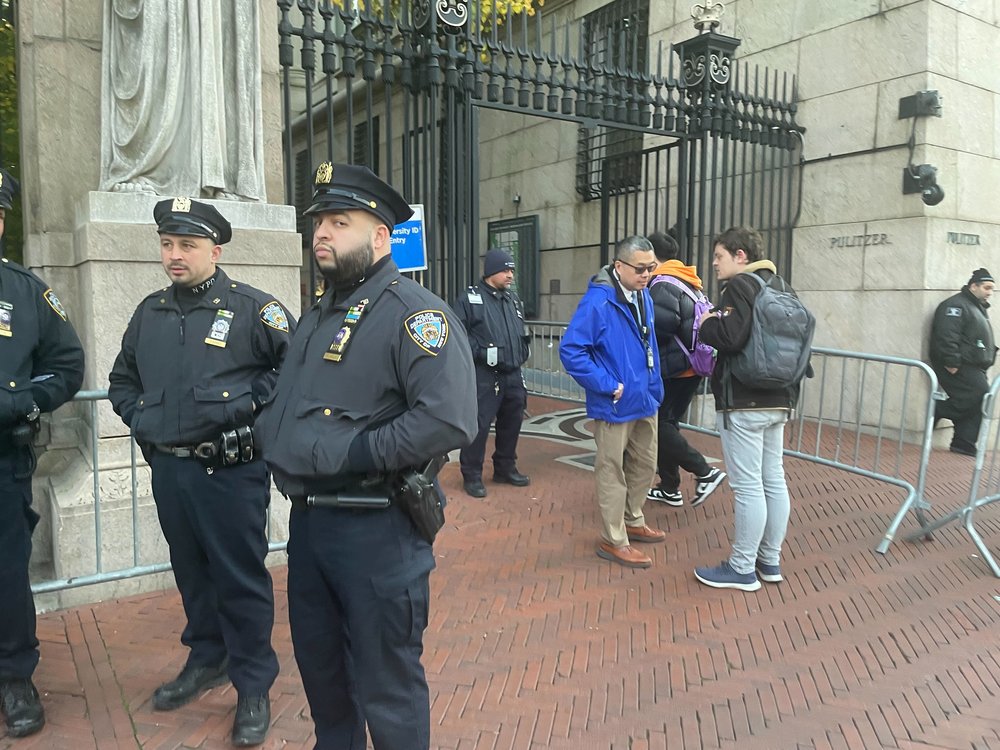'Everyone is scared': Columbia reels as students feud over Israel-Hamas war
Nov. 20, 2023, 1:15 p.m.
Many students say they’re masking up at protests — or using keffiyehs to conceal their faces — out of fear of online harassment for publicly supporting Palestinians since the Oct. 7 attacks.

N-95s and surgical masks are once again a common accessory at Columbia University, but not because of COVID-19.
Many students say they’re masking up at protests — or using keffiyehs to conceal their faces — out of fear of online harassment for publicly supporting Palestinians since the Oct. 7 attacks.
The masks are perhaps the most obvious sign of the fear and anger that has consumed campus life in recent weeks. Students on both sides of the debate over the Israel-Hamas war say dialogue has deteriorated to outright hostility. Meanwhile, some faculty members say they fear the professional consequences of delving into the issue.
In interviews, students and faculty on both sides of the conflict agree the university has struggled to respond to the protests and attacks. Earlier this month, university leaders suspended the chapters of two prominent student groups, Students for Justice in Palestine and Jewish Voice for Peace, for repeatedly holding “unauthorized events.”
The final straw, the university wrote in an announcement, was a protest on Nov. 9 that included “threatening rhetoric and intimidation.” Organizers distributed masks at the contentious rally, where Gothamist saw a man removed by police after shouting antisemitic threats. The NYPD had no information on the incident.
But the suspension of the student groups only prompted more protests.

On Monday, a coalition of more than 2,800 alumni vowed to withhold donations in response to the suspensions. A protest over the move was expected in the evening.
Since the attack by Hamas militants on Oct. 7 that killed 1,200 people in Israel, New York City’s Ivy League university campus has been reeling.
“People want to express their views, and I think in a normal situation, it would be fine doing that without masks or without hiding their identities,” Deen Haleem, a 24-year-old student activist at Columbia Law School, said at a recent protest in response to the suspension of the student groups.
“It's not ‘we disagree with you,’" Haleem added. "It's not ‘we're going to have a debate.’ It's ‘we're going to put your picture up on a board and we're going to effectively encourage people to seek harm against you.’”
Jewish and Israeli students also said they were scared on campus.
“It’s unsettling a bit," Eitan Feifel, a Jewish student at Columbia, told Gothamist earlier this month. "I have definitely seen it more in some of my peers and friends just looking over their shoulder when they walk around. You don’t know who’s in class with you [who] … looks at you differently after what’s happened."
“It’s just tense," Feifel said.
In roughly a month and a half, an Israeli student hanging posters of hostages held in Gaza was beaten with a broomstick, according to a criminal complaint against the alleged assailant; a man identifying himself as a Zionist and "officer of administration" at Columbia University Medical Center was caught on tape saying he hoped “everyone of these people die” as he watched pro-Palestinian students; and a swastika was drawn on the wall of a fourth-floor bathroom in the international affairs building.
An open letter signed by Columbia students and faculty, titled “Oppression Breeds Resistance," was met with outrage because critics saw it as wrongly blaming Israel for Hamas’ attack. A conservative nonprofit, Accuracy In Media, then began driving an electronic billboard truck around campus, singling out students who allegedly signed the letter as “leading antisemites.”
Students said the so-called “doxxing trucks” were a real-world manifestation of a surge in online harassment since protests over the Israel-Gaza war began.
Last week, the New York Times reported on research showing antisemitic content spiked more than 919% on X, formerly known as Twitter, in the month following the Oct. 7 attack. Anti-Muslim hate speech on the platform jumped 422% on Oct. 7 and Oct. 8, according to the report.
Many masked protestors told Gothamist that covering their faces was a direct response to the doxxing truck. Others said they needed masks to feel comfortable in public. Many of the masked protesters said their Muslim and pro-Palestinian friends are too scared to leave their homes at all.
Even Accuracy In Media’s President Adam Guillette said his group had recently faced death threats and harassment for its campaign around Columbia and other campuses. But he vowed in a statement to still hold “bullies” accountable.
Protests continue to disrupt campus life as Israel’s war in Gaza continues. More than 13,000 people in Gaza have been killed, according to the health ministry in Gaza.
At a Nov. 9 rally, some students demanded Columbia divest from companies with ties to Israel and discontinue a dual-degree program with Tel Aviv University.
In a separate gathering that day, Jewish students met on campus to read the names of the hostages still under Hamas captivity in Gaza. One student, Noam Woldenberg, said he feels campus is a dangerous place for Jewish students.
“The school has to do whatever they can to ensure that safety,” Woldenberg said.
Barnard College sociology professor Debbie Becher wrote an op-ed in the Columbia Spectator condemning the suspension of the student groups and calling for a cease-fire in Gaza.
“Absolutely everyone is scared of speaking for different reasons," Becher told Gothamist. "In terms of being worried about losing friends and worried about seeming to imply something they're not implying."

Columbia administrators have launched a “doxxing resource group” for students and a task force to address a surge in antisemitic incidents.
“Maintaining a safe, civil, and respectful campus environment is always a priority for the university administration and never more so than at present,” said Ben Chang, a spokesperson for Columbia University. “All of us need to come together to reject hate speech, discrimination, and violations of Columbia’s core values. Using words that incite dangerous behavior is clearly prohibited.”
Security has been boosted at entrances to campus. Gated entrances have been locked during protests. And campus police have only allowed people with student IDs to enter through the main entrances. An email sent to students indicated campus police took the measure “out of an abundance of caution.”
Fadi Shuman, a junior in the School of General Studies, acknowledged the tense atmosphere on campus, but said he chose not to conceal his face during a protest.
“I am not wearing a mask. I’m Palestinian and I’m very outspoken about the cause and the reason I refuse to wear a mask, first of all, is I’m not going to be silenced,” Shuman said. “I'm not going to give them that when we're speaking up for a just cause, something that I truly, truly believe in and everybody with a heart believes in.”
Columbia student says in lawsuit he was wrongly smeared as antisemite by ‘doxxing truck’